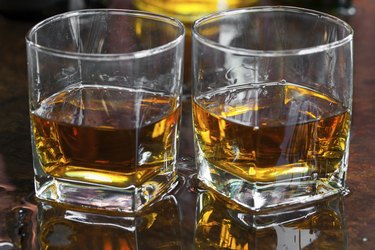
Growing up, you may have heard that a shot of whiskey does wonders for a sore throat. While a glass of this potent drink may feel comforting to some, it can have detrimental effects on the throat as well. These range from relatively rapid changes that take place in the throat after drinking whiskey to gradual changes that take place over years and even decades.
Short-Term Effects
Video of the Day

Whiskey is one of the strongest alcoholic drinks. Straight whiskey is approximately 40 percent alcohol compared about 5 to 7 percent in beer. This means the throat is exposed to a higher concentration of alcohol per standard drink. When whiskey reaches the throat, it often causes a burning or stinging sensation. This occurs because the concentrated alcohol irritates the lining -- or mucosa -- of the throat causing a pain response in the nerves. Alcohol also acts as a solvent, washing away the protective mucus that lines the throat and causing a drying effect. This can lead to temporary throat dryness and soreness, and possibly a raspy or hoarse voice.
Video of the Day
Long-Term Effects

Drinking whiskey or other alcoholic beverages can permanently damage the tissues of the mouth, throat, voice box and/or food pipe -- or esophagus -- over time. This damage sometimes progresses to cancer. Moderate to heavy drinking increases the risk for all of these cancers, with the highest risk among those who drink the most. A 2012 report from the International Agency for Research on Cancer notes that for the same level of alcohol consumption, women tend to have a higher risk for these cancers compared to men. The risk for cancers of the mouth and throat are further increased in both men and women when alcohol consumption is paired with tobacco use.
Alcohol’s Role in Throat Cancer

The mechanisms by which whiskey and other alcoholic beverages play a role in the development of throat cancer are complex and not yet fully understood. Possible local contributing factors include destruction of the protective mucous barrier, reduced production of saliva, and disruption of the normal bacteria in the mouth and upper throat. These factors may provoke changes within the cells repeatedly exposed to alcohol, which could eventually progress to cancer.
The chemical acetaldehyde may be another contributing factor. Acetaldehyde is a toxic byproduct of alcohol metabolism. It circulates in the bloodstream and damages genetic material and proteins throughout body. This chemical is also found in alcoholic beverages prior to consumption, and whiskey contains similar amounts to other distilled spirits. Additionally, excessive drinking can impair the ability to absorb beneficial nutrients that help ward off cancer, including several vitamins.
Preventing Throat Damage From Whiskey

Alcohol is woven into the societal fabric, and it can be difficult to avoid a sip here and there -- which is unlikely to be harmful. However, it's important to be careful and measured in your consumption of alcoholic beverages, especially with highly concentrated spirits like whiskey. For most people, limiting consumption is the best way to prevent throat damage from whiskey.
If you think your drinking habits may be putting you at risk, see your doctor to get help in cutting back or stopping your alcohol consumption.
- National Institute on Alcohol Abuse and Alcoholism: What Is a Standard Drink?
- National Cancer Institute: Alcohol and Cancer Risk
- Alcohol Health & Research World: Alcohol’s Role in Gastrointestinal Tract Disorders
- American Journal of Epidemiology: Type of Alcoholic Beverage and Risk of Head and Neck Cancer—A Pooled Analysis Within the INHANCE Consortium
- Addiction: Carcinogenicity of Acetaldehyde in Alcoholic Beverages: Risk Assessment Outside Ethanol Metabolism
- International Agency for Research on Cancer: Consumption of Alcoholic Beverages
- International Agency for Research on Cancer: Alcohol Consumption and Ethyl Carbamate
- Journal of Preventive Medicine & Public Health: Alcohol as a Risk Factor for Cancer: Existing Evidence in a Global Perspective
- National Institute on Alcohol Abuse and Alcoholism: Alcohol's Effects on the Body
- American Cancer Society: Alcohol Use and Cancer
Is this an emergency? If you are experiencing serious medical symptoms, please see the National Library of Medicine’s list of signs you need emergency medical attention or call 911.